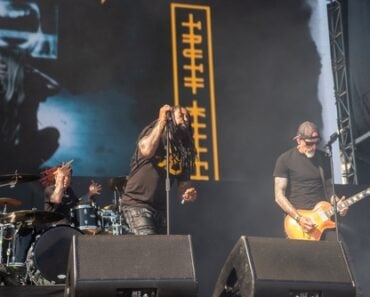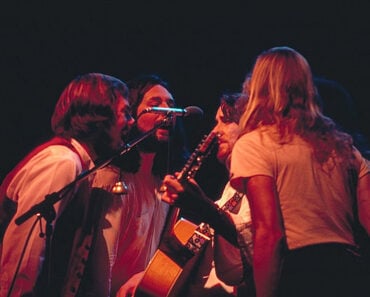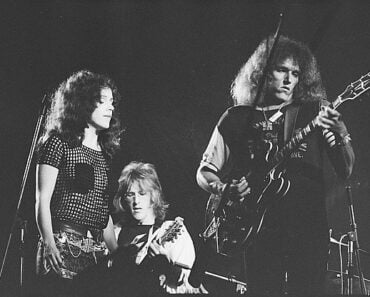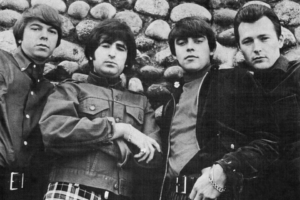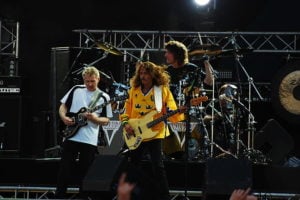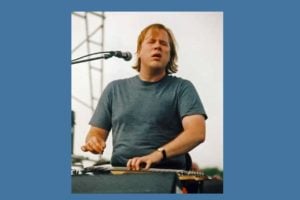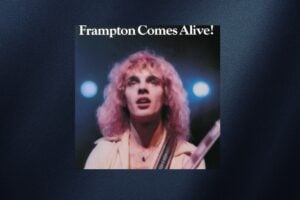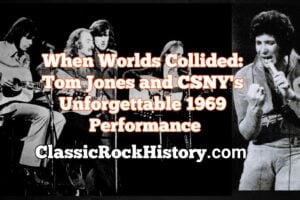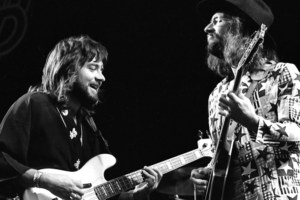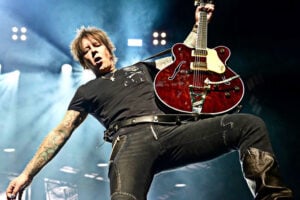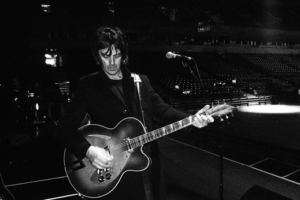
Feature Photo: Laura Levine, Public domain, via Wikimedia Commons
The Replacements formed in Minneapolis, Minnesota, in 1979, originally starting as a punk rock band before evolving into pioneers of alternative rock. The band consisted of four core members throughout most of their career: guitarist and vocalist Paul Westerberg, guitarist Bob Stinson, bassist Tommy Stinson, and drummer Chris Mars. The group recorded seven studio albums between 1981 and 1990, with their most acclaimed works being Let It Be (1984) and Tim (1985).
The band initially signed with Minneapolis independent label Twin/Tone Records, releasing their first three albums and an EP before moving to major label Sire Records in 1985. Tim became their first album to chart on the Billboard 200, peaking at number 183. Their 1989 album Don’t Tell A Soul reached number 57 on the Billboard 200 and spawned their biggest hit “I’ll Be You,” which reached number 51 on the Hot 100 and number 1 on both Modern Rock and Mainstream Rock charts. Despite critical acclaim, the band never achieved major commercial success and was known for chaotic live performances often influenced by alcohol consumption.
The Replacements disbanded in 1991 after their final album All Shook Down. The band reunited briefly in 2006 to record songs for a Slim Dunlap benefit project, then again from 2012 to 2015 for tours and festival appearances with additional touring musicians Josh Freese on drums and Dave Minehan on guitar. Throughout their career, the band experienced only one major lineup change when Bob Stinson was dismissed in 1986 and replaced by Slim Dunlap, and later when Steve Foley replaced Chris Mars in 1990.
Paul Westerberg
Paul Harold Westerberg was born December 31, 1959, and served as the lead vocalist, guitarist, and primary songwriter for The Replacements from 1979 to 1991, and again during their reunion periods in 2006 and 2012-2015. Westerberg joined the band after hearing them practice in the basement of the Stinson brothers’ house while walking home from his job as a janitor for U.S. Senator David Durenberger. He convinced the existing members to let him join by telling the current singer that the band wanted to fire him, leading to the singer’s departure and Westerberg’s entry into the group.
Westerberg wrote and sang lead vocals on all of The Replacements’ major albums, including Sorry Ma, Forgot to Take Out the Trash (1981), Stink (1982), Hootenanny (1983), Let It Be (1984), Tim (1985), Pleased to Meet Me (1987), Don’t Tell a Soul (1989), and All Shook Down (1990). His songwriting evolved from straight punk rock to incorporating elements of folk, country, and classic rock, creating the template for alternative rock. Songs like “I Will Dare,” “Bastards of Young,” “Alex Chilton,” and “I’ll Be You” showcased his ability to combine raw emotion with melodic hooks and clever lyrics.
Following The Replacements’ breakup in 1991, Westerberg launched a successful solo career. He released his first solo album 14 Songs in 1993, followed by Eventually (1996) and Suicaine Gratifaction (1999) on major labels. After leaving the major label system, he became more prolific, releasing Stereo and Mono simultaneously in 2002, followed by Come Feel Me Tremble (2003) and Folker (2004). He also recorded under the pseudonym Grandpaboy and composed soundtracks for films including Singles and Open Season. Despite The Replacements being banned from Saturday Night Live after a chaotic 1986 performance, Westerberg was invited back as a solo artist in 1993.
Tommy Stinson
Thomas Eugene Stinson was born October 6, 1966, and became The Replacements’ bassist at the remarkably young age of 12, when his older brother Bob gave him a bass guitar to keep him off the streets. Tommy remained with the band from its formation in 1979 through its breakup in 1991, and participated in all reunion activities from 2006 and 2012-2015. He was the youngest member of the band and grew up essentially within the music industry, learning his craft while touring and recording throughout his teenage years.
Tommy played bass on all of The Replacements’ studio albums and was integral to their rhythm section alongside drummers Chris Mars and later Steve Foley. His bass playing provided the foundation for the band’s evolution from punk rock to alternative rock, and he contributed backing vocals throughout their catalog. Despite his young age when the band started, he became a crucial creative force and remained committed to the group’s artistic vision throughout their career, even as the band struggled with alcohol-related issues and erratic behavior.
After The Replacements disbanded, Tommy quickly formed Bash & Pop in the early 1990s, releasing Friday Night Is Killing Me in 1993. He also fronted the band Perfect in the mid-1990s before joining Guns N’ Roses in 1998, where he served as bassist for 18 years until 2016. During his tenure with Guns N’ Roses, he played on the long-delayed Chinese Democracy album and co-wrote several songs including the title track. He also released two solo albums: Village Gorilla Head (2004) and One Man Mutiny (2011), and served as a touring and recording member of Soul Asylum from 2005 to 2011. In 2017, he revived Bash & Pop with a new lineup and released Anything Could Happen, followed by his latest project Cowboys in the Campfire with guitarist Chip Roberts.
Bob Stinson
Bob Stinson was born in 1959 and was the founding guitarist of The Replacements, serving from the band’s formation in 1979 until his dismissal in 1986. Bob was the older brother of bassist Tommy Stinson and originally formed the band as “Dogbreath” with drummer Chris Mars before Paul Westerberg joined. He was the creative catalyst who gave his young brother a bass guitar and initiated the musical partnership that would become The Replacements. Bob was known for his innovative guitar playing and his role in establishing the band’s early punk rock sound.
Bob played lead guitar on The Replacements’ first four albums: Sorry Ma, Forgot to Take Out the Trash, Stink, Hootenanny, and Let It Be. His guitar work was characterized by a raw, aggressive style that perfectly complemented the band’s punk rock approach during their early years. However, as Paul Westerberg began steering the band toward a more melodic, mainstream-oriented sound, creative tensions arose. Bob preferred the band’s harder, faster early material and became increasingly resistant to the musical direction Westerberg was pursuing.
Bob was dismissed from the band in 1986 due to various personal and professional issues, including substance abuse problems. The exact circumstances of his departure remain somewhat disputed, but it occurred as the band was transitioning from independent label Twin/Tone to major label Sire Records and seeking broader commercial appeal. After leaving The Replacements, Bob continued playing music in local Minneapolis bands including Static Taxi and the Bleeding Hearts, but struggled with drug and alcohol addiction. He died in 1995 at the age of 35, two weeks after getting sober, from what was reported as complications related to his long-term substance abuse.
Slim Dunlap
Bob “Slim” Dunlap was born August 14, 1951, in Plainview, Minnesota, and joined The Replacements as lead guitarist in 1987, replacing Bob Stinson. Dunlap served with the band from 1987 until their breakup in 1991, playing on their final three studio albums. He was significantly older than the other band members and brought a more experienced, professional approach to the group during their major label years. Dunlap was recruited after the band had already signed to Sire Records and needed a guitarist who could handle both studio work and extensive touring.
Dunlap played guitar on The Replacements’ albums Pleased to Meet Me (1987), Don’t Tell a Soul (1989), and All Shook Down (1990). His guitar work was more polished and conventional than Bob Stinson’s, fitting the band’s evolution toward a more radio-friendly sound. He contributed to some of their most commercially successful songs, including their hit single “I’ll Be You.” Dunlap’s playing style was influenced by classic rock and blues, and he helped the band maintain their musical integrity while pursuing mainstream success.
After The Replacements disbanded in 1991, Dunlap maintained a lower national profile but remained active in the Twin Cities music scene. He released solo albums and continued performing locally until suffering a massive stroke in 2012, which left him unable to move or speak properly. The stroke effectively ended his musical career and created significant medical expenses. In response, Paul Westerberg and Tommy Stinson reunited in 2012 to record the “Songs for Slim” EP as a benefit project, which helped raise funds for Dunlap’s care. This project marked the first new Replacements music in over 20 years and led to their subsequent reunion tours. Slim Dunlap died on December 18, 2024, from complications related to his stroke.
Chris Mars
Chris Mars was born in 1961 and served as The Replacements’ drummer from the band’s formation in 1979 until 1990. Mars was one of the original members who formed the initial trio “Dogbreath” with Bob Stinson before Paul Westerberg joined and the band became The Replacements. He was known as the quiet member of the group and provided the steady rhythmic foundation that anchored their sound throughout most of their career. Mars was a high school dropout when he met Bob Stinson, and together they began the musical project that would evolve into one of alternative rock’s most influential bands.
Mars played drums on seven of The Replacements’ eight studio albums, from Sorry Ma, Forgot to Take Out the Trash through Don’t Tell a Soul. His drumming style evolved along with the band’s musical progression from hardcore punk to alternative rock, and he was essential to their live performances throughout the 1980s. Mars was known for his solid, no-frills approach to drumming that supported the band’s songs without calling attention to himself. He also contributed to the band’s visual aesthetic and artwork, designing posters and promotional materials during their early years.
Mars left The Replacements in 1990, before the recording of their final album All Shook Down, due to frustration with the band’s direction and Westerberg’s increasing control over the creative process. After leaving the band, Mars pursued a career as a visual artist and painter, largely stepping away from the music industry. He released several solo albums in the 1990s, including Horseshoes and Hand Grenades (1992) and 75% Less Fat (1993), but never achieved significant commercial success with his musical endeavors. Mars has remained relatively private about his time with The Replacements and has rarely participated in interviews or retrospective projects about the band, preferring to focus on his visual art career.
Steve Foley
Steve Foley was born in 1959 and served as The Replacements’ drummer during their final period, from 1990 to 1991. Foley replaced Chris Mars when Mars left the band in 1990, just before the recording sessions for what would become their final album, All Shook Down. Foley was brought in to complete the band’s obligations and help finish their career on a professional note. He was an experienced drummer who had worked with various Minneapolis-area bands before joining The Replacements during their transition period.
Foley played drums on The Replacements’ final studio album All Shook Down (1990), though the album was largely a Paul Westerberg solo project featuring various session musicians rather than a full band effort. His contribution to the band was primarily functional, helping them complete their recording and touring obligations during a period when the group was already fragmenting. Foley’s drumming was competent and professional, but he had little time to develop the musical chemistry that had characterized the band’s earlier work with Chris Mars.
After The Replacements disbanded in 1991, Foley continued working as a musician in the Minneapolis music scene. He played with various local bands and maintained a career as a professional drummer, though he never achieved the recognition that came with his brief tenure in The Replacements. Foley died in 2008, seventeen years after the band’s breakup. His time with the band was short but important for helping them complete their career during a difficult transitional period when the original lineup was dissolving.
Check out similar articles on ClassicRockHistory.com Just click on any of the links below……
Top 10 Songs From The Replacements
Complete List Of The Replacements Albums And Discography
Read More: Artists’ Interviews Directory At ClassicRockHistory.com
Read More: Classic Rock Bands List And Directory



